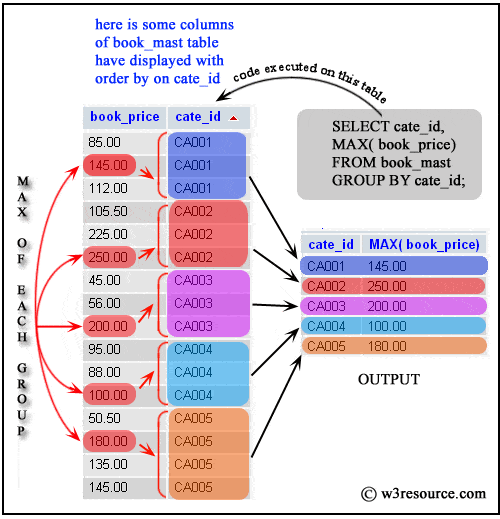SQLite max() function
Description
The max() aggregate function returns the maximum value of all values in the group. The maximum value is the value that would be returned last in an ORDER BY on the same column. The function returns NULL if and only if there are no non-NULL values in the group.
Syntax:
max(expr);
Where expr is an expression.
Example: SQLite max() function
The following SQLite statement will return the maximum 'book_price' from 'book_mast' table.
Sample table: book_mast
Sample Output:
sqlite> SELECT MAX(book_price) ...> FROM book_mast; MAX(book_price) --------------- 250
Example: SQLite max() function with GROUP BY, HAVING
SQLite MAX() function retrieves the maximum value from an expression which has undergone a grouping operation by GROUP BY clause and filtered using HAVING clause followed by some condition. The following SQLite statement will extract those countries ('country') which have eight or more branches.
Sample table: publisher
Sample Output:
sqlite> SELECT country,MAX(no_of_branch) ...> FROM publisher ...> GROUP BY country ...> HAVING MAX(no_of_branch)>=8; country MAX(no_of_branch) ---------- ----------------- India 10 UK 8 USA 25
Example: SQLite max() function with GROUP BY
SQLite MAX() function with GROUP BY retrieves maximum value of an expression which has undergone a grouping operation (usually based upon one column or a list of comma separated columns). The following SQLite statement will extract all “cate_id”s and the maximum 'book_price' in each group of 'cate_id'. ‘GROUP BY ‘ clause have grouped “cate_id's”.
Sample table: book_mast
Sample Output:
sqlite> SELECT cate_id, MAX( book_price) ...> FROM book_mast ...> GROUP BY cate_id; cate_id MAX( book_price) ---------- ---------------- CA001 145 CA002 250 CA003 200 CA004 100 CA005 180
Pictorial Presentation

SQLite MAX() function with group by on two columns
The following SQLite statement will extract those countries ('country') and publisher cities ('pub_city') which has the maximum number of branches ('no_of_branch') in each group of 'country' and 'pub_city'.
Sample table: publisher
Sample Output:
sqlite> SELECT country,pub_city,MAX(no_of_branch) ...> FROM publisher ...> GROUP BY country,pub_city; country pub_city MAX(no_of_branch) ---------- ---------- ----------------- Australia Adelaide 6 India Mumbai 10 India New Delhi 10 UK Cambridge 6 UK London 8 USA Houstan 25 USA New York 15
SQLite MAX with group by and order by
The following SQLite statement will extract those countries ('country') and publisher cities ('pub_city') which have the maximum number of branches ('no_of_branch') for each group of 'country' and 'pub_city'. ‘GROUP BY ‘ clause have grouped 'country' and 'pub_city' . The 'country' column have sorted in ascending order by the usage of ORDER BY clause.
Sample Output:
sqlite> SELECT country,pub_city,MAX(no_of_branch) ...> FROM publisher ...> GROUP BY country,pub_city ...> ORDER BY country; country pub_city MAX(no_of_branch) ---------- ---------- ----------------- Australia Adelaide 6 India Mumbai 10 India New Delhi 10 UK Cambridge 6 UK London 8 USA Houstan 25 USA New York 15
SQLite MAX() function with distinct
SQLite MAX() function retrieves the maximum value of an expression if the function is accompanied by a DISTINCT clause. The following SQLite statement will extract category ('cat_id') wise maximum number of pages ('no_page') from the 'book_mast' table.
Sample table : book_mast
Sample Output:
sqlite> SELECT cate_id,MAX(DISTINCT no_page) ...> FROM book_mast ...> GROUP BY cate_id; cate_id MAX(DISTINCT no_page) ---------- --------------------- CA001 345 CA002 600 CA003 510 CA004 350 CA005 350
Previous:
Group_Concat()
Next:
Min()
